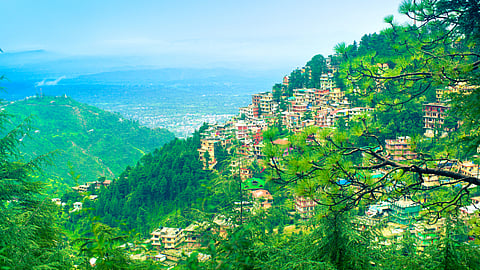
- Destinations
- Experiences
- Stay
- What's new
- Celebrating People
- Responsible Tourism
- CampaignsCampaigns
- SubscribeSubscribe
- Buy Now

Dharamshala, often known for its Tibetan spiritual presence and the residence of the Dalai Lama, is one of Himachal Pradesh’s most enchanting destinations. But beyond the bustling cafés and monasteries of McLeod Ganj, there lies a deeper, more diverse world waiting to be explored. From forested trails and peaceful villages to colonial-era landmarks and vibrant local markets, the places to visit in Dharamshala reflect its rich tapestry of cultures and landscapes. Whether you're seeking peace in a monastery, a panoramic view from Triund, or an afternoon among the tea gardens of the Kangra Valley, Dharamshala offers more than just a spiritual retreat. It’s a place where every corner tells a story—of migration, resilience, and natural beauty. This guide goes beyond the well-trodden paths to uncover the most rewarding places to visit in Dharamshala for travellers looking to experience its full spectrum.
Just 2 km from McLeod Ganj, the Bhagsu Nag Temple sits nestled in a traditional Gaddi tribal village. A natural spring flows through the temple complex, adding to its serene atmosphere. Around 1.5 km further ahead lies the Bhagsu Waterfall, where clear mountain water cascades down a rocky 20-foot drop—a refreshing stop for trekkers and nature lovers alike.
Set against the stunning backdrop of the Dhauladhar range, this renowned Devi temple offers panoramic views of the Baner Khud and the lush Lahla forests. Located about 15 km from Dharamshala, it’s a peaceful retreat that blends spiritual significance with natural beauty.
Perched at an altitude of 4,780 feet, the Dharamshala Cricket Stadium is one of the highest in the world. Surrounded by the majestic snow-capped peaks of the Himalayas, the stadium offers a breathtaking setting for cricket lovers. It hosted its first international match between India and Pakistan in 2005.
Located about 4 km from McLeodganj, the serene Dal Lake—distinct from its namesake in Srinagar—is cradled by a dense forest of deodar trees. A favourite picnic spot for locals and visitors alike, the lake comes alive each year during an annual fair held on the occasion of Radhastami, drawing devotees and tourists in equal measure.
For panoramic views of the Kangra Valley and the majestic Dhauladhar range, head to the viewpoint atop Dharamkot, located about 11 km from Dharamshala. This quiet hamlet, popular among trekkers and nature lovers, offers some of the most spectacular vistas in the region.
Another scenic spot to take in sweeping views of the snow-capped Dhauladhar peaks and the lush Kangra Valley is the Indru Nag Temple, located just 5 km from Dharamshala. Dedicated to the serpent deity Indru Nag, this hilltop shrine is not only a spiritual site but also a favourite among paragliders and photographers for its breathtaking vistas.
About 17 km from Dharamshala, Kangra town makes for a charming base to explore the beautiful valley that shares its name. The town is also a stop on the Kangra Valley Railway, where you can hop on a delightful toy train ride along a narrow-gauge track stretching between Pathankot and Jogindernagar—offering a slow, scenic journey through the hills, bridges, and forests of Himachal.
Kareri Lake, around 9 km west of Dharamshala, sits cradled in a meadow that gently gives way to dense oak and pine forests. This high-altitude, shallow freshwater lake is a tranquil retreat, especially popular with trekkers. Frozen between December and April, it serves as a scenic base camp for longer treks into the Dhauladhar range and further toward Chamba and Bharmour via the Minkiani and Baleni Passes.
About 1.5 km beyond Dal Lake lies the Naddi Sunset Point, a quiet perch that offers sweeping views of the snow-draped Dhauladhar peaks and the rolling countryside below. For those with a spirit of adventure, the area also serves as a gateway to several rewarding treks—whether it’s the serene alpine waters of Kareri Lake, the forested route to the Guna Devi Temple, or the popular hike up to Triund with its panoramic mountain vistas.
Forsythganj, located in the upper reaches of Dharamshala, carries echoes of the British colonial era. Once a prominent settlement during the Raj, its legacy is still visible in the architecture and atmosphere. The most notable landmark here is the neo-Gothic St. John in the Wilderness Church, built in 1852 and set amidst deodar forests. Its stained-glass windows and moss-covered graves lend the area an old-world charm that transports visitors back in time.
You can trek up to Triund, a scenic ridge perched above McLeodganj—the seat of the Dalai Lama—for breathtaking panoramic views of the Dhauladhar snow peaks. The trail, about 9 km long, is moderately challenging and typically takes around four hours to complete. For the more adventurous, continuing another two hours beyond Triund leads to the snow line, where the terrain becomes steeper and more rugged, but the views are even more rewarding.
